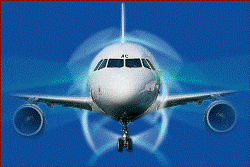ROUNDUP: European airports to cut pollution, move to biofuels
 Geneva - Starting in 2013, up to 100 European airports will take part in a plan to reduce carbon dioxide (CO2) emissions over the continent's airspace by half a million tonnes a year, aviation industry groups said Tuesday.
Geneva - Starting in 2013, up to 100 European airports will take part in a plan to reduce carbon dioxide (CO2) emissions over the continent's airspace by half a million tonnes a year, aviation industry groups said Tuesday.
The plan to the use the so-called Continuous Descent Approach (CDA) for landing, where aircraft fly a smooth approach into an airport rather than the classical stepped approach, announced at the Aviation and Environment Summit in Geneva, would reduce carbon output and fuel usage.
Also, for those living near landing sites, the new approach, industry officials said, would cut the noise around the airports by between 1 and 5 decibels.
Industry officials have described the approach as a "win-win for all."
The airline industry was also looking to start using bio-fuels within the next few years and was hoping for certification by as early as 2010.
Boeing's Bill Glover told reporters he expected biofuels to achieve "commercial availability in three to five years."
Executives at the conference said they were aiming to use second- generation biofuels, including some derived from algae, so as to not drain food and water resources.
"We want to get 100 per cent from biofuels that don't compete with food supplies," said Peter Steele of the Air Transport Action Group.
However, the industry would also be polluting less due to economic reasons, as the global crisis has hit aviation particularly hard. Both cargo and passenger rates have take a precipitous fall since the middle of last year.
Airlines have been reducing capacity to cope with the decline, though demand drops have continued to outpace the cutbacks.
The International Air Transport Association estimated this month the industry would lose 4.7 billion dollars in 2009, nearly double the prediction made at the end of last year.
Quentin Browell, a spokesman for the International Air Transport Association, said the CDA plan would take a few years to roll out, explaining the delay in implementation.
He said trials had been conducted at specific airports before, "but this is the first time a region as a whole set such a target."
While the new plan would apply to European airports, all carriers, regardless of nationality or point of origin, would have to adapt to the new measures, according to Browell.
A success in Europe could lead to similar plans in other parts of the world. (dpa)